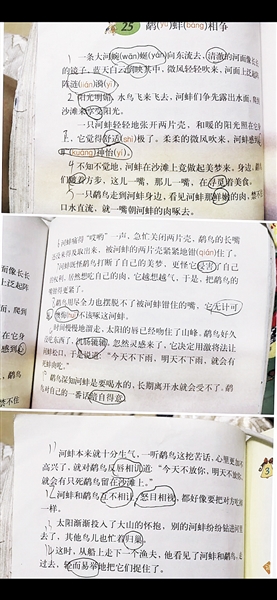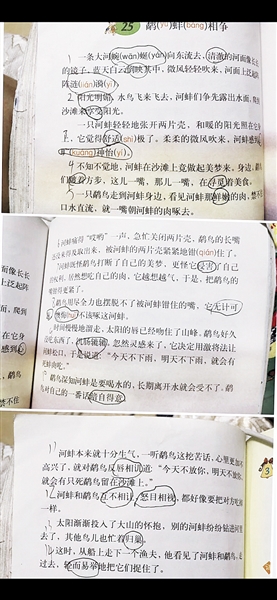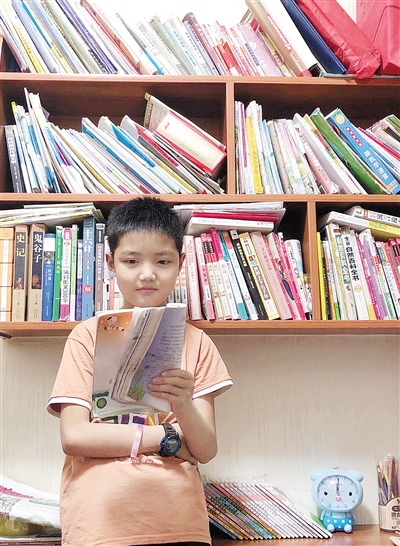How do primary school students question the "fighting between snipes and mussels"? Press: No change.



"The clam’s meat was caught by the bird’s mouth, and the clam caught the bird’s mouth with its shell. So, how did they speak?" Recently, Li Juan returned to his hometown in Dianjiang and was questioned by his nephew. Li Juan looked up the information, but he couldn’t explain it himself. Finally, he sent this "test question" to a circle of friends.
My nephew’s "soul inquiry"
Last weekend, Li Juan returned to her hometown in Dianjiang. She was chatting with her family, and was suddenly taken aside by her nephew Huang Shengkaila to ask questions. My nephew, Huang Shengkai, is 11 years old and is currently in the fifth grade of Wenhua Road Primary School in Dianjiang County.
"He picked up the textbook, turned to page 110, let me read it first, and said that he had read it to see if he found any problems." Li Juan read it carefully, but found no problem.
"I didn’t see any problems." Li Juan solemnly answered my nephew.
My nephew Huang Shengkai refused and asked Li Juan directly, "Look, the clam’s meat was caught by the bird’s mouth, and the clam caught the bird’s mouth with its shell, so how did they speak?" After hearing this question, Li Juan was stunned at that time, and I really didn’t know how to answer it.
The story comes from the Warring States Policy.
So, she carefully read her nephew’s textbook. "It’s a text in the first volume of the fifth grade of the Western Normal University Edition."
In order to explain it to my nephew, Li Juan also checked the original text. "I looked it up with Baidu Encyclopedia. This is an article in the Warring States Policy. My nephew is learning the vernacular of this article."
After reading the original text, Li Juan still didn’t know how to explain it to my nephew, so he had to tell him "that’s what it says in the Warring States Policy". Unexpectedly, my nephew asked again, "Is this story in The Warring States Policy a fabrication, or is King Hui of Zhao in it too stupid?"
Li Juan told him that "The Struggle between the Snail and the Clam" was selected from "The Warring States Policy and Yan Ce", which recorded that the debater Su Dai borrowed fables circulated by the people to illustrate that the stalemate between Zhao Yan would bring harm to both countries, thus preventing Zhao from attacking Yan State.
"Later, I asked their Chinese teacher, and the teacher also said that this is an fable. But he is still not satisfied. He believes that even stories cannot make such low-level mistakes. "
Praise the child’s critical spirit
Regarding Huang Shengkai’s question, Liu Lihong, a Chinese teacher at Bashu Primary School in Chongqing, said, "First of all, we should praise the children’s critical spirit and skepticism, as well as the spirit of being true to knowledge." Teacher Liu Lihong said that since the child raised a question, as parents and teachers, we should follow this question to find the answer.
"For example, we can try it with our children and keep our mouths shut. In fact, we can also make a sound, but it is not very clear."
In addition to finding the answer through experiments, children can also be guided, "This is a fable, and the key point is to understand the truth expressed in the story. Here, the author uses anthropomorphic techniques to say that if it is really true, snipe and clam are not a species at all, and there will be no dialogue between them. "
Press response: the textbook will not be changed.
"This student’s questioning is very good. The story in the textbook is from the Warring States Policy. This is how the ancient prose is recorded. We will not change the textbook for the time being." Teacher Liu Jianghua from the Basic Education Branch of Southwest Normal University Press said in an interview.
He told reporters that from the perspective of life logic, there are some problems, which exist in many fables, including foreign fables. Fable stories allow some imagination and exaggeration, and the story itself is to explain the truth, not to tell stories.
Chongqing morning post upstream journalist Luo Xuemei